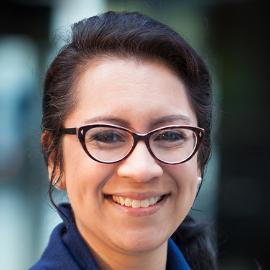Newest Board Member Blends Ethics, Compliance and Service
Business Ethics/0x15:1078x703/prod01/channel_34/media/albers-school-of-business-and-economics/centers-and-programs/center-for-business-ethics/balanced-rock-piles.jpg)
Meet Monica Lopez Reinmiller, a seasoned ethics and compliance leader and the newest member of the Center for Business Ethics’ Advisory Board. Read more to learn about her career, service, and commitment to Seattle University.
Monica Lopez Reinmiller is an experienced legal professional who specializes in corporate ethics and legal compliance. She is the newest member of the Center for Business Ethics’ Advisory Board. In this interview, Rong Jin, MSF graduate student and Frank Shrontz Scholar, asks Ms. Lopez Reinmiller about her career in ethics and compliance and the journey she took to arrive in her current role.
Ms. Lopez Reinmiller currently serves as the Head of Ethics and Compliance at Panasonic Avionics Corporation and is also Associate General Counsel at Panasonic of North America. She has over 25 years of experience advising multinational companies, overseeing global compliance programs across various industries, including electronic manufacturing, telecommunications, technology, and automotive, in organizations such as T-Mobile and Toyota.
She is an active member of the Washington State Bar, National Hispanic Bar Association, and legal pro bono community. As a pro bono volunteer attorney she advocates for racial justice and equality volunteering for several Seattle-based civil legal aid providers such as Communities Rise and the Seattle Clemency Project. Currently she serves as a Board member of the Eastside Legal Assistance Program. In addition to her work as an attorney she holds an MBA from Xavier University.
Rong Jin (RJ): You have rich experience and expertise in corporate ethics and legal compliance across various industries. Could you tell us how you think the role of business ethics in a company's success, and how compliance professionals contribute to ensuring ethical principles are followed within the company?
Monica Lopez Reinmiller (MLR): The role of ethics and compliance professionals is multi-faceted. An organization’s compliance and ethics framework is typically anchored in Code of Conduct or ethics policies that guide employee decisions, operational structure, and interactions with key stakeholders that include customers and communities served by the organization. The contribution ethics and compliance professionals make to an organization and these stakeholders is really driven by values, which serve as a north star or moral compass that will envelop decision-making, processes, and relationships. Through ongoing guidance, policies and resources, and employee support compliance professionals continuously strive to inspire and assure that employees and business partners such as vendors have the necessary guidance to know and understand how to live organizational values and to execute their mission responsibly.
RJ: Can you tell us about your journey about how you became a compliance officer? Did you face any unique challenges or obstacles? What steps did you take to break into the compliance field, and what advice would you give to minority students and young professionals who are interested in pursuing a career in compliance?
MLR: My journey as a compliance professional was not a conventional one. While I entered the workforce as a licensed attorney I did not being my compliance career in a legal defense firm or government attorney role. After law school I assumed operational compliance roles that led to opportunities in the white-collar investigative field as an attorney and thereafter as a compliance program leader. I was fortunate to have multiple mentors and champions along the way that not only guided my development but also provided me opportunities to stretch myself in new areas and as a practicing attorney.
There is no check list or prescribed way to develop one’s career and to minority students and professionals who are faced with starting a career or who face career decisions, to you I say: connect with professionals in compliance networks, be it business groups, minority bar associations, or other networks that focus on legal compliance and ethics. I didn’t understand nor leverage the power of my network early in my career and I cannot emphasize the importance of networking to anyone interested in starting a compliance career in particular. Networking connections can and will serve as job resources, referrals, and mentors.
RJ: Can you tell us about your appointment to the advisory board for the university's Center for Business Ethics? What do you hope to bring to the relationship with Seattle University?
MLR: I’ve been a strong supporter of the university’s mission and commitment to Jesuit education for many years as a volunteer at SU events like Albers Ethics Week, as well as an active member of the Northwest Ethics Network – an independent group of compliance and ethics professionals, organized and hosted by SU’s Center for Business Ethics. Over the ten-plus years of my serving the SU community I’ve had the pleasure of participating in many wonderful programs that afforded me the opportunity to meet SU’s academic leadership, professors, and students throughout the years. The opportunity to serve on the Center for Business Ethics advisory board was both a surprise and an organic result of my commitment to the SU community.
Share on LinkedIn !
Tuesday, June 27, 2023
